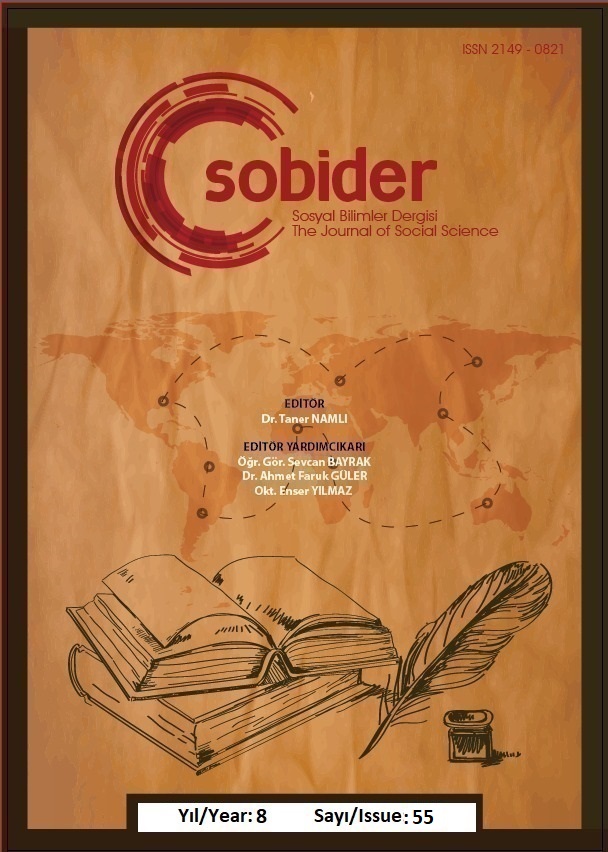Author :
Abstract
Bu araştırma İran ve Türkiye’de yaşayan 7-11 yaş çocukların, sayı, miktar, madde, uzunluk, ağırlık, alan hacim korunumu bakımından farkı incelemek amacıyla yapılmıştır. Çalışma grubunu, Tebriz İlkokulunda öğrenimlerini sürdüren 7-11 yaş grubu rastgele seçilmiş 50 çocuk ile Mersin’den seçilmiş 50 çocuk, toplam 100 çocuk oluşturmaktadır. Bu beş farklı yaş grubu Piaget’nin korunum niteliğini incelemek üzere geliştirdiği problemler ve hazırlanan bilgi formu kullanılarak toplanmıştır. Verilerin istatistiksel analizleri için SPSS 20.0 programı kullanılmıştır. İran’da ve Türkiye’de yaşayan 7-11 yaş grubu çocukların hem korunum niteliklerin kazanmaları hem de cinsiyete göre arasında farkı test etmek amacıyla t-testi uygulanmıştır. Bilişsel gelişim puanları ile yaş arasındaki ilişkiyi gözlemek amacıyla da verilere Pearson momentler çarpımı korelasyon, sınıf seviyesi ve bilişsel gelişim ilişkisini incelemek amacıyla varyans analizi yapılmıştır. Sonuçlara göre bilişsel gelişimin cinsiyet, yaşanan ülke ya da kültürden etkilenmediği gözlenmiştir. Beklendiği gibi ve kuramla tutarlı bir şekilde yaş ya da sınıf seviyesi arttıkça bilişsel performans da artmaktadır.
Keywords
Abstract
The aim of the present research was to investigate the difference between 7-11 age children living in Iran and Turkey in relation to the number, amount, matter, length, weight, space and volume. The study group consists of 50 randomly selected children aged 7-11 who continue their education in Tabriz primary school and 50 children selected from Mersin, a total of 100 children. These five age groups were gathered by means of the problems developed by Piaget to investigate the conservation development and the prepared information form. SPSS 20.0 software was used to analysis the data. To examine the difference between the conservation development of 7-11 age children living in Iran and Turkey, independent group t-test was administered to the data, to examine the gender difference in conservation development, again independent group t-test was administered to the data. In order to examine the relationship between cognitive development andage, variance analysis was performed to examine the relationship between Pearson moments multiplication correlation, class level and cognitive development in the data. According to the results, it was observed that cognitive development was not affected by gender, country of residence or culture. As expected and consistent with the theory, cognitive performance increases as the age or grade levelincreases.
Keywords
- Agger, C. (2007). “Conservation of number test with small and large quantities on male and female preschool children”, Indiana Undergraduate of Cognitive Science, 2: 28-32.
- Ahioğlu-Lindberg, E. N. (2011). “Piaget ve Ergenlikte Bilişsel Gelişim”, Kastamonu Eğitim Dergisi,19 (1): 1-10.
- Bacanlı, H. (2011). Eğitim Psikolojisi (Geliştirilmiş 17. Baskı). Ankara: Pegem Akademi Yayınları.
- Berk, L. E. (1997). Child Development (4th Edition). Needham Heights, MA: Allyn & Bacon.
- Craig, G. J. (1996). Human Development. Paramus, NJ: Prentice Hall.
- Çapri , B. ve Çelikkaleli , Ö. (2005). “İlköğretim Birinci Kademedeki (7-11Yaş Grubu) Çocuklarda Korunum Gelişim Düzeylerinin Cinsiyet ve Sınıf Değişkeni Açısından İncelenmesi”, Mersin Üniversitesi Eğitim Fakültesi Dergisi, 1 (1): 48-65.
- Dasen , P. R., Lavallfie, M. ve Retschitzki, J. (1979) Training conservation of quantity (liquids) in West African children, International Journal of Psychology 14 (1979) 57-68.
- Er, H. N. (2008) Zaman kavramıyla zenginleştirilmiş Türkçe dil etkinliklerinin 5- 6 yaş çocuklarında zaman kavramı gelişimine etkisinin incelenmesi, Yayınlanmamış Yüksek Lisans Tezi, Selçuk Üniversitesi, Konya.
- Nadim, P. (1996). İran eğitim sisteminin değerlendirmesi. Eğitim Bilimler Dergisi, sayı 8, s. 153-165. Marmara Üniversitesi. McCown, R., Driscoll, M., & Roop, P. G. (1996). Educational Psychology, a LearningCentered Approach to Classroom Practice (2th Edition). Boston: Allyn and Bacon.
- Özyürek, A., Gürleyik, S., Özdemir, S. ve Güven Sancı, N. (2017) Çocuklarda sayı, sıvı ve uzunluk korunumu gelişiminin cinsiyet ve yaş değişkeni açısından incelenmesi, Millî Eğitim, Sayı 216 s.5-19.
- Piaget, Jean (1950). The origins of intellect. London: Routledge and Kegan Raul ltd.
- Piaget, J. (1952) The Origins of Intelligence in Children. NewYork, International University Press, Inc.
- Piaget, J. (1972). The moral judgement of the child (M. Gabain, Çev.). London: Routledge& Kegan Paul Ltd. (Orjinali 1932 baskısı).
- Piaget, J. (1969) Judgement and Reasoning in the Child. London, Routledge & Kegan Paul Ltd.
- Pogozhina, I. (2014). “Developmental of the Logical Operations in Preschool Children”, Procedia-Social and Behavioral Sciences, 146:290-295.
- Simatwa, E. M. W. (2010). “Piaget’s Theory of Intellectual Development and Its Implication for Instructional Management at Pre-Secondary School Level”, Educational Research and Reviews, 5 (7): 366-371.
- Senemoğlu, N. (2013). Gelişim, ÖğrenmeveÖğretim: KuramdanUygulamaya (23. Baskı). Ankara: YargıYayınevi.
- Yapıcı, Ş. veYapıcı, M. (2005). GelişimveÖğrenmePsikolojisi, AnıYayıncılık, Ankara. Yalım, N. (2009) 5-6 yaş çocuklarında matematiksel şekil algısı ve sayı kavramının gelişiminde drama yönteminin etkisi, Yayınlanmamış Yüksek Lisans Tezi, Selçuk Üniversitesi, Konya.
